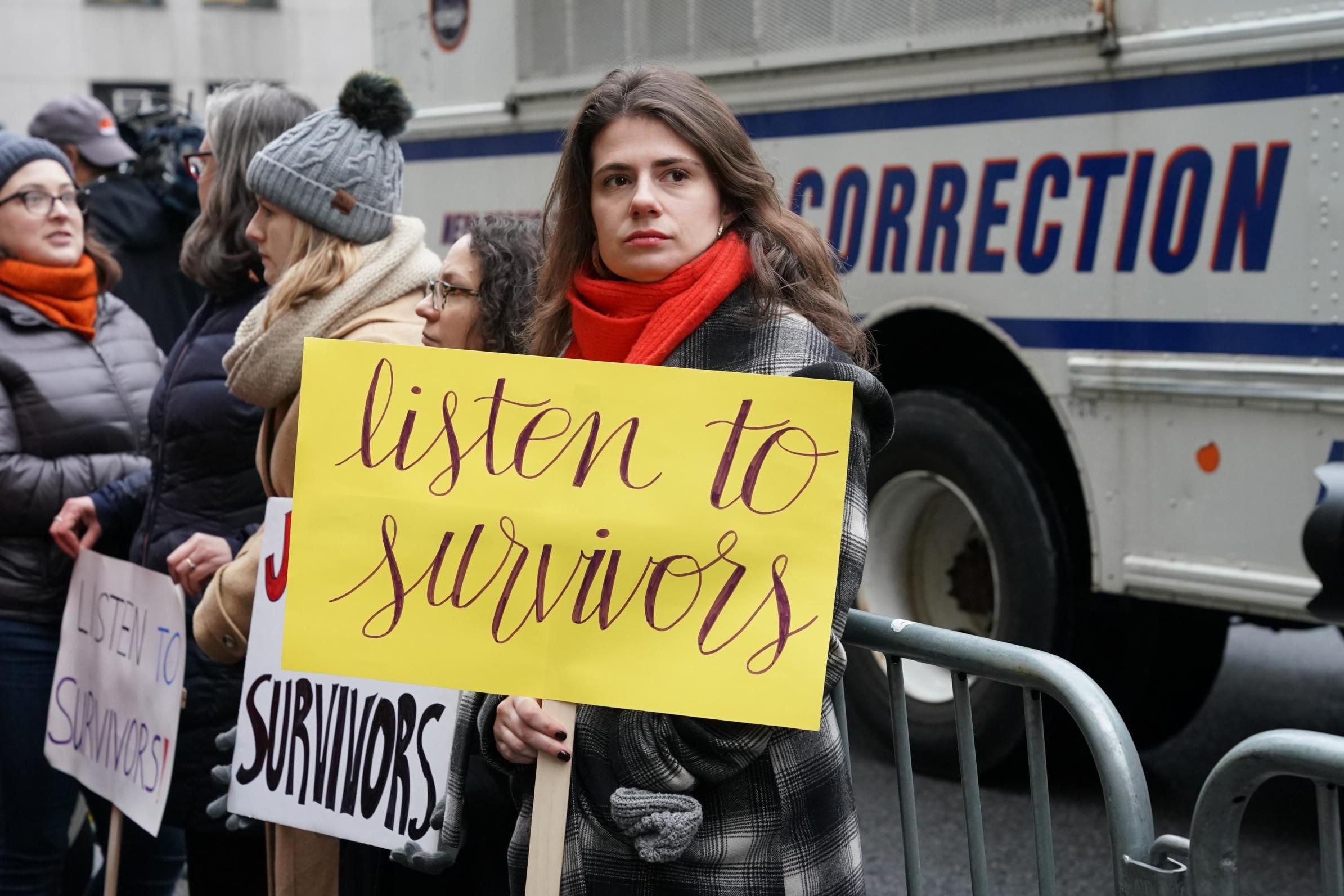‘Listen to survivors’: Harvey Weinstein trial begins with protests, outrage and a call for respect
Proceedings are expected to last for six weeks in New York City
Harvey Weinstein’s criminal trial started with respect. The word was plastered across the Franklin Street subway station, one of the stops leading to the Manhattan court where the former Hollywood mogul was appearing on Monday morning. The signs were, in fact, there as a homage to the late singer Aretha Franklin (and the 1967 hit in which she spells out the word’s seven letters) – but you could still view it as a touch of cosmic irony given the circumstances.
Respect, after all, tends to dominate the courtroom, where procedure and solemnity prevail. That was the case outside the Manhattan court as well. Demonstrators, including the actor Rosanna Arquette, had gathered at the bottom of the steps on Centre Street earlier in the morning, some of them holding signs demanding justice and urging others to “listen to survivors”. It wasn’t absurd to expect some chanting, some booing – some shouted slogans, maybe – but there was none of that as the former Hollywood producer made his way inside, leaning on a walking frame.
Instead, the streets of New York were so quiet that one woman wondered out loud if the demonstrators weren’t allowed to tell Weinstein what they thought. It didn’t appear to be the case – there is certainly no rule against talking or yelling on a New York City sidewalk – but nonetheless, Weinstein disappeared inside in relative silence. Perhaps it was respect – for the courtroom, for the judicial process, for the strong police presence keeping a close eye on things. Or perhaps heckling just seemed small compared to the magnitude of the trial about to unfold.
That’s not to say that Centre Street wasn’t abuzz with Weinstein talk before and after his arrival. By 9am, the press corps had gathered in tight huddles on both sides of the road, photo and video cameras at the ready. Members of the National Organisation for Women, a feminist advocacy group based in Washington, DC, held up signs. Not long before Weinstein showed up, Arquette waved over a group of demonstrators, so that all could stand together during the mogul’s arrival. Outside the courtroom, journalists spoke English, Spanish, and French. The world was watching.
Later on, Arquette, Rose McGowan, Sarah Ann Masse, Dominique Huett, Lauren Sivan, Louise Godbold and Paula Williams – all of whom have come forward against Weinstein – gathered behind a stand covered in microphones from various TV stations to give joint statements. It was cold – the kind of cold that numbs your toes if you stand in one place for too long – but the weather didn’t deter anyone. Rather, the women bundled up, most of them wearing red, and demanded accountability on Weinstein’s part.
“You brought this upon yourself by hurting so many, you have only yourself to blame,” said McGowan, while Arquette referenced the Time’s Up movement: “As we stand here at the beginning of a new year and a new decade, time’s up on sexual harassment in all workplaces. And time’s up on the pervasive culture of silence that has enabled abusers like Weinstein.”
Arquette, the first to speak, had to start her statement over several times due to issues with some of the many microphones in front of her. Certainly, it was in everyone’s best interests for the actor to be heard and seen clearly, but something about having to watch her get interrupted over and over again by the press corps didn’t feel entirely right – perhaps because it was a particularly ill-chosen day to tell a woman how and when to speak. Nevertheless, Arquette laughed off the technical mishaps and eventually managed to get her remarks out in full, saying of herself and other women: “We aren’t going anywhere.”

Weinstein could spend the rest of his life behind bars if he’s convicted of the most serious charges against him. Whether or not that is the case will be decided over the course of the next six weeks. This is the second big trial of the #MeToo movement – the first one was Bill Cosby’s and resulted in a conviction in April 2018. (Weinstein is accused of raping a woman in 2013 and performing a forcible sex act on a different woman in 2006. He has pleaded not guilty and denied all allegations of non-consensual sex.)
Weinstein’s trial is likely to be viewed as a test for #MeToo and its impact. A conviction would be interpreted as a vindication of the movement, while an acquittal would likely feel like a setback. The allegations against the producer, first published by the New Yorker and by The New York Times in October 2017, have contributed to making respect for women an international cause celebre. Narratives of sexual harassment and consent have started to shift.
The trial will also serve as a reckoning for the entertainment industry. Coincidentally, the Weinstein trial opened less than 24 hours after the Golden Globes, one of the most high-profile awards ceremonies Hollywood has to offer, wrapped up in Los Angeles. Michelle Williams, while accepting a trophy, gave a powerful speech about reproductive rights, urging women to vote in their own self-interest as “it’s what men have been doing for years”. Regardless of what happens between the walls of the courtroom, #MeToo’s legacy can already be felt.
Bookmark popover
Removed from bookmarks